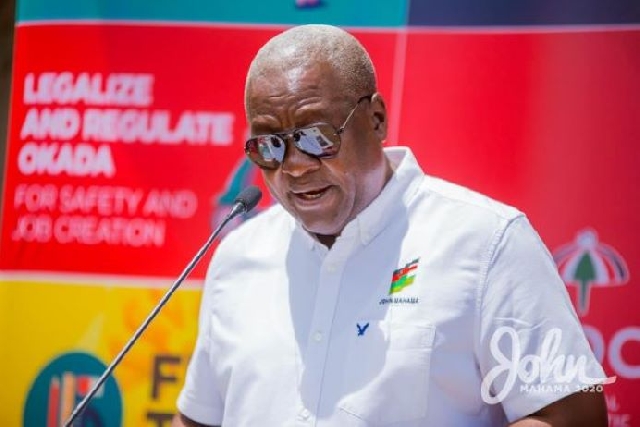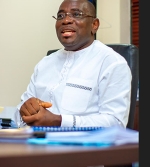BoG 'illegally printed billions of cedis and worsened our economic troubles' - Mahama asks minority to monitor use of $600m IMF money
 John Dramani Mahama
John Dramani Mahama
Former President John Mahama has asked the minority caucus to keep an eye on the Bank of Ghana with regard to the recent disbursement of the second tranche of $600 million by the International Monetary Fund following the first review of the $3-billion three-year extended credit facility that was approved in May 2023 by the Bretton Woods institution.
While urging the government to be responsible with the use of the IMF funds, Mr Mahama took a swipe at the Bank of Ghana, accusing it of exacerbating Ghana's economic woes by flooding the system with newly-printed notes.
Mr Mahama said "under normal circumstances, the release of $600 million by the International Monetary Fund (IMF) to the government of Ghana should provide relief to the already-overburdened and suffering Ghanaian."
"It is, however, evident that Ghanaians will continue to suffer as long as the Akufo-Addo-Bawumia and NPP remain in office", he posted on Facebook.
Mr Mahama urged "the outgoing NPP government to be cautious, responsible and judicious in utilising the IMF $600 million and other funds that may be made available to Ghana from the World Bank and other development partners".
He noted that his party will closely keep an eye on how the government uses the funds.
"I have already encouraged the NDC minority in parliament to ensure strict oversight on both the government and not to take their eyes off the Bank of Ghana that illegally printed billions of cedis and aggravated our economic situation".
"On my part, I will, from time to time, continue to engage the Ghanaian public about my vision to build the Ghana we want and how we will work together to create well-paying jobs through my 24-hour economy policy and other pragmatic initiatives".
Last year, the Cassiel Ato Forson-led minority caucus marched in demand for the resignation of the Governor of the Bank of Ghana, Dr Ernest Addison as well as his two deputies.
"The purpose of this ptotest is to express our revulsion at the illegal printing of money (about GHS80 billion) between 2021 and 2022 by the BoG for the corrupt Akufo-Addo/Bawumia/NPP government which led to a hyper inflation rate of 54.1 per cent in December 2022", Dr Ato Forson said in a statement at the time.
The caucus claimed GHC22.04bn of that amount was used by the BoG to support the government's budget without parliamentary approval.
"This singular act of BoG", he emphasised, "has negatively impacted livelihoods and businesses and pushed about 850,000 Ghanaians into poverty in the year 2022 alone".
The caucus said as representatives of the people, it was "totally disgusted by the crass mismanagement and reckless mishandling of the affairs of the Bank of Ghana,which resulted in a gargantuan loss of GHS60.8 billion and a negative equity of GHS55.1 in 2022 with its attendant hardships on Ghanaians".
The Bank of Ghana, however, denied the allegations.
In a statement issued on Tuesday, 26 July 2022, the central bank said Dr Forson’s claim could not be farther from the truth.
The bank observed that Dr Forson’s reaction was in response to the 2022 mid-year fiscal policy review which was presented to parliament by the Minister of Finance on Monday, 25 July 2022.
It explained: “In Appendix 2A of the Mid-Year Fiscal Policy Review document, under Financing, out of the total financing of GHC28.12 billion, an amount of GHC22.04 billion was captured under BoG”, adding: “This is the amount being referred to by the Ranking Member as BoG’s printing of currency to support the budget”.
Concerning the loss and negative equity posted by the central bank, Governor Addison later explained at a press conference that it was important for Ghanaians to appreciate that the GHS60.8 billion loss recorded by the nank in 2022 "were technical losses arising from the haircut and the application of accounting standards (in particular, IFRS 9) to estimate expected credit losses over the tenor of the Government debt held by Bank of Ghana".
He told journalists on Monday, 21 August 2023: "It is not money lost by the Bank of Ghana through its operations in 2022".
Rather, he said "one should look at this as a reflection of the total cost of the economic and social crisis the country faced over the years and an attempt to resolve a major structural problem of the Ghanaian economy."
Also, Dr Addison said this is not the first time the central bank has recorded negative equity.
"I must also add that, if one takes time to go through historical financial statements of the Bank of Ghana, you will realise that this is not the first time that the Bank has gone into negative equity", he stated.
He reported: "During the early years of structural adjustment, very large exchange rate depreciations led to revaluation lossesthat drove the Bank into negative equity".
Indeed, Dr Addison mentioned, "anytime the economy faces major challenges, the Bank of Ghana balance sheet suffers, and the equity position moves into negative territories".
"You will recall that in 2017 and 2018, the Bank of Ghana incurred similar negative equity from the impairment of legacy liquidity support loans granted in 2015 and 2016 to insolvent banks, which our external auditors impaired due to the doubtful prospects of recovering from those insolvent banks".
"The Bank of Ghana, however, recovered and generated profits throughout the period 2019 to 2021", he pointed out.
"It is worth noting that Central Banks are not commercial banks", he highlighted, stressing: "Bank of Ghana’s current financial condition will not impact negatively on the operations of the Bank".
He said the IMF Technical Assistance mission validated this conclusion before the necessary decisions were taken.
"In their opinion, the Bank of Ghana was policy solvent and would remain so, as it had enough income to cover monetary policy operational costs", Dr Addison said.
The Bank of Ghana, he indicated, "had sufficient capital amounting to about 15 per cent of its total liabilities", noting: "Its recommendation was for the Bank to retain all profits and a reassessment should be made in the year 2027".
"The Bank will also manage to reduce its operational costs during this period", he promised.
In all these, Dr Addison said the Bank of Ghana has "acted within the applicable laws". He also denied claims that the central bank has been bankrolling the government annually.
"It is not true that Bank of Ghana has been providing financing for the Government every year. There has been zero-financing in 2017, 2018, 2019 and 2021. The Bank of Ghana has only had to support in the pandemic year of 2020 and the crisis year of 2022. The Bank of Ghana Act (612), as amended, limits financing of Government to 5 per cent of previous year’s tax revenue", Dr Addison reiterated.
"This provision in the law has been adhered to since I took office in April 2017. Between 2017 and 2019, in addition to the requirements of the Bank of Ghana Act (612), as amended, the Bank signed a Memorandum of Understanding (MOU) with the Ministry of Finance to even impose a tighter restriction of zero-central bank-financing, and this was observed strictly, even though MOUs are not legally binding. Between 2012 and 2015, the Bank of Ghana provided overdraft to finance government and Cocobod every year. And there was neither a pandemic nor a global economic crisis".
"When Ghana was hit with the Covid-19 in 2020, Section 30(6) of the Bank of Ghana Act (612), as amended, was triggered, and as indicated earlier, the Bank purchased GHC10 billion worth of Covid-19 bonds to support the economy through the pandemic".
"This was done within the applicable lawsgoverning the Bank of Ghana. When section 30 (6) of the Bank of Ghana Act (612), as amended, is triggered, it, allows the Governor, the Minister for Finance and the Controller and Accountant General toagree on a new limit of central bank financing".
"The law further says that the Minister of Finance will then have to inform parliament and the Minister has since informed parliament as part of his briefing to update Parliament on the IMF programme and status of the Domestic Debt Exchange".
Source: Classfmonline.com
Trending News

Education Minister makes a case for restoration of Ghana's true political history
11:43
NALAG President commends Zoomlion CEO for outstanding contribution to sanitation and local development
10:07
E/R: Kwahu South health directorate rolls out comprehensive health services for Easter festivities
11:35
“GHS 300m can build a pad factory” – MP criticizes gov't’s sanitary pad procurement plan
09:47
Committee commissioned for establishment of Kumawu Nursing and Midwifery College
11:19
'Obey KMA rules or I lash you' - MCE to traders
09:18
A/R: Tensions erupt in Akumadan over ownership of Astroturf project
13:07
GA/R: Traditional priestesses reject appointment of Ebi Bright as Tema MCE
09:04
V/R: Gov't reaffirms commitment to Keta sea defence project – Alex Segbefia
16:40
Togbe Afede XIV destoools Ho Bankoe Mankrado over misconduct and insubordination
10:49



